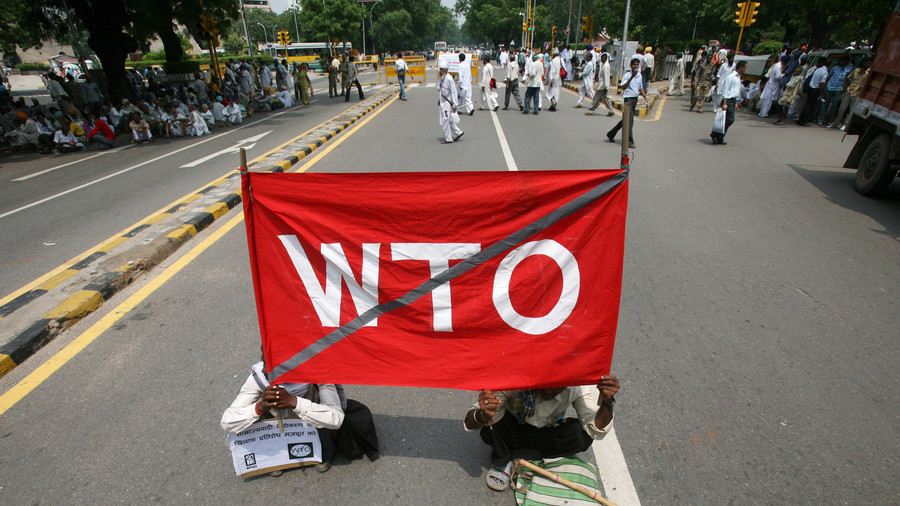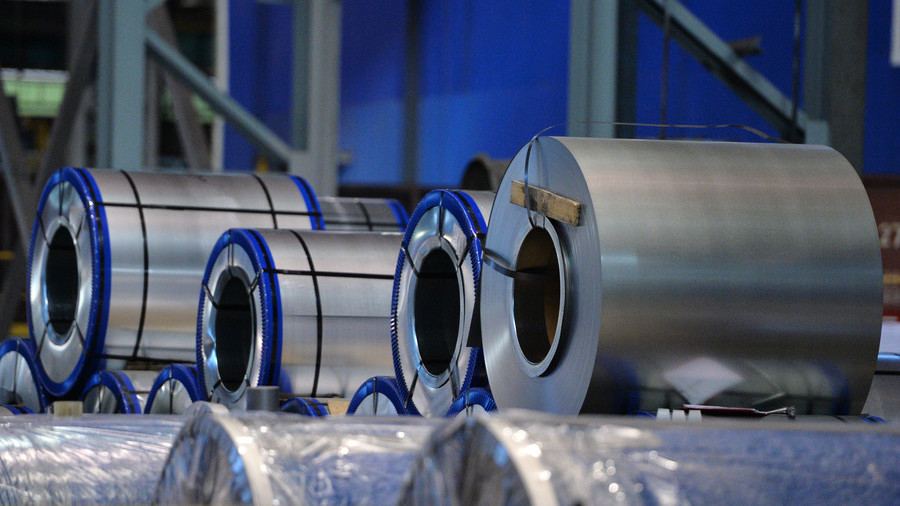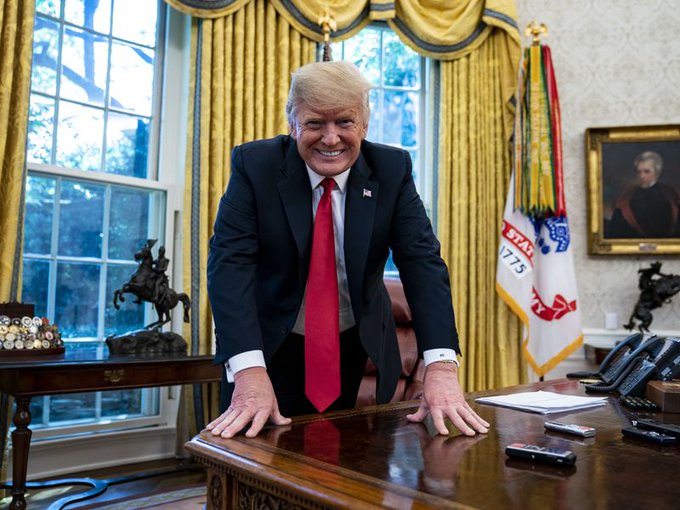The Empire may have to declare sanctions against itself!
US may leave WTO if they don’t ‘shape up’ – Trump to Bloomberg

RT,
30
August,2018
US
President Donald Trump would consider pulling out of the World Trade
Organization if "they don't shape up," he told Bloomberg in
an interview.
"If
they don’t shape up, I would withdraw from the WTO," Trump
said on Thursday at the White House, before departing for a rally in
Indiana.
Last
month, the US president told reporters that the WTO has treated the
US “very badly” for many years, and that the Geneva-based body
will need to “change their ways.”
US
Trade Representative Robert Lighthizer has called allowing China into
the WTO a mistake and accused the trade body’s dispute settlement
system of interfering with US sovereignty. The Trump administration
has recently blocked the appointment of judges to the WTO’s appeals
body.
On
Wednesday, Washington filed a complaint with the WTO against Russia’s
retaliatory tariffs, which were a response to Trump’s steel and
aluminum duties imposed earlier this year.
In
the wide-ranging interview, Trump also said he likes and respects
Federal Reserve chairman Jerome Powell, despite publicly disagreeing
with the Fed’s recent interest rate increases. The Fed has raised
rates five times since Trump’s inauguration, and there is talk of
two more increases this year.
Trump poses for Bloomberg interview. bloomberg.com
Trump
said the Fed should be helping the government in trade disputes with
China, the EU and others, just as their central banks are helping
their governments.
“We
are not being accommodated,” he said. “I don’t like that.”
Trump
is also “thinking about” indexing capital gains to inflation,
believes the EU proposal to eliminate auto tariffs is “not good
enough,” and said he is not considering firing Attorney General
Jeff Sessions - at least not until after the November midterm
elections.
“I
just would love to have him do a great job,” Trump said about
Sessions., according to Bloomberg.
US files WTO lawsuit against Russia over import taxes on American goods

29
August, 2018
Washington
has filed a complaint with the World Trade Organization (WTO) against
tariffs imposed by Moscow on some US imports, the trade body
confirmed on Wednesday.
According
to Russia’s economy ministry, Washington has misinterpreted the
measures taken by Moscow, explaining that Russia complies with the
WTO regulations.
“The
United States misinterprets the nature of the measures taken by the
Russian side. We are acting within the framework of the WTO Agreement
on Safeguards, which allows compensating for damage from special
protective measures taken by another country,” the ministry said.
Europe
working on payment system alternative to SWIFT & IMF to attain
financial independence from US
In
July, Russia raised tariffs from 25 to 40 percent on a number of US
products in response to Washington’s levies on Russian steel and
aluminum. Moscow appealed to the WTO to resolve the metal tariffs
dispute.
Russia's
retaliatory measures, targeting $87.6 million worth of US goods,
covers just a minimal part of Russia’s estimated losses of $450
million due to US metal tariffs. They include certain types of road
construction machinery, oil and gas equipment, metalworking and rock
drilling tools as well as optical fiber.
Moscow
will reportedly impose further tariffs on $450 million worth of US
imports if the WTO rules the US tariffs are illegal. Under the
current rules, the $87.6 million in tariffs is the maximum amount a
country can levy without the WTO decision.
Earlier
this year, the White House slapped a number of trading partners with
tariffs of 25 percent on imported steel and 10 percent on imported
aluminum. They include Russia, China, India, the European Union,
Canada, Mexico, South Africa, Turkey and South Korea. Washington
explained the move was due to national security concerns. However,
several countries affected by the levies have launched WTO
complaints, accusing the US of protectionism.
Apart
from the trade dispute, Moscow and Washington are involved in the
worst diplomatic crisis since the Cold War. Over recent years, the US
has imposed several rounds of sanctions against Russia over a number
of accusations. They include involvement in the conflict in eastern
Ukraine, reunification with Crimea, alleged US election meddling, a
purported violation of sanctions against North Korea and alleged
nefarious activity in cyberspace.
Moreover,
the US State Department has recently banned the issuing of loans to
Moscow, and US exports of weapons and dual-use products to Russia.
The measure reportedly came amid Russia’s alleged involvement in
the poisoning of former double-agent Sergei Skripal in the UK back in
March.
US official hints at sanctions over India’s planned S-400 purchase from Russia

A
top US defense official has renewed warnings to India against
purchasing Russian-made arms and defense systems like the S-400,
ahead of a historic first meeting next month between both nations’
defense and foreign affairs heads.
“We
would still have very significant concerns if India pursued major new
platforms and systems (from Russia),” Randall
Schriver, the US assistant secretary of defense for Asian and Pacific
security affairs, told an
audience at the Carnegie Endowment For International Peace in
Washington on Wednesday.
“If
they choose to go down that route, like I said, I can’t sit here
and tell you today that the waiver will necessarily be
used,” Schriver
continued, referencing a congressional loophole that allows US allies
to protect themselves from current sanctions imposed against Russia
by Washington.
‘A
good satellite does what it is told’: US warns Turkey & other
allies against buying Russian S-400
Under
current US rules against Russia, third-party governments could face
sanctions for dealing with the Russian defense or intelligence
sectors.
However,
due to recent lobbying by Defense Secretary Jim Mattis, Congress has
granted the US president and the secretary of state an ability to
grant waivers, such as when an ally nation transitions from legacy
Russian gear to Western arms.
India,
a long-time buyer of Russian defense gear since the Soviet era, has
in recent years turned towards Western defense firms in the US
and France for
new equipment. But it still relies on Russian expertise and equipment
to maintain its existing arsenal and fleets.
In
the recent past, this stockpile has proven useful for US foreign
policy objectives in the region, particularly in Afghanistan. Last
month, India delivered three Russian-origin attack helicopters to the
Afghan Air Force (AAF), with three more expected to be on the way.
It
has also provided spare parts and maintenance expertise to the AAF’s
grounded Soviet-era fleet as part of Washington’s multi-billion
modernization of the Afghan Armed Forces.
A
sticking point in the relationship, however, stems from the purchase
of big-ticket items like the S-400 air-defense system, which has
also plagued Washington’s
relationship with Turkey.
India
is poised to
ink contracts on the S-400 deal later this year, with deliveries
scheduled to start as early as 2020.
The
sale is expected to be discussed during talks next week when Mattis
and Secretary of State Mike Pompeo visit their counterparts in New
Delhi, after which Schriver noted the administration will decide
whether concerns over India’s S-400 purchase outweigh the desire to
strengthen strategic ties.
“Our
strong preference,” Schriver
concluded, “is
(for India) to seek alternatives and see if we could be a partner to
India in addressing those defense needs.”
Thursday,
August 30, 2018 12:29 PM
By
Bloomberg News
(Bloomberg)
--China warned a bipartisan group of U.S. lawmakers not to interfere
in its internal affairs Thursday after they sought sanctions against
Chinese officials over allegations the country was holding as many as
1 million Muslims in “reeducation” camps.
The
17 legislators -- led by Senator Marco Rubio of Florida and
Representative Chris Smith of New Jersey -- requested the penalties
Wednesday in a letter addressed to Secretary of State Michael Pompeo
and Treasury Secretary Steven Mnuchin. They want to unleash the
Global Magnitsky Act of 2016, which has been employed to punish
Russian oligarchs and Turkish officials, to restrict the travel and
freeze the assets of top Communist Party officials.
“The
policies and equal rights that Chinese minorities enjoy are far
better than in the U.S., which has lot issues with racism and human
rights protection,” Chinese Foreign Ministry spokeswoman Hua
Chunying told a briefing in Beijing. The lawmakers should focus on
issues at home “instead of interfering in other countries’
internal politics, playing judges on human rights and casting blame,
or even threatening to impose unreasonable sanctions,” she said.
The
proposal, which had been previously floated by at least one State
Department official, represents the most serious response yet to
reports of the camps in its western region of Xinjiang. The bid
underscores the potential for ties to deteriorate further as Trump
pressures Chinese counterpart Xi Jinping over trade and blames the
dispute for derailing nuclear talks with North Korea.
“There
have been recent reports of deaths in custody, including suicides, in
Xinjiang, and the Chinese government shows no signs of halting these
rights violations,” the lawmakers said. “At a time when the
Chinese government is seeking to expand its influence through the
Belt and Road Initiative, the last thing China’s leaders want is
international condemnation of their poor and abusive treatment of
ethnic and religious minorities.”
The
lawmakers specifically called for sanctions against Xinjiang’s
regional party secretary Chen Quanguo, a member of China’s
25-member Politburo who has helped create one of the world’s most
restrictive security regimes after a series of attacks in 2013 and
2014. The Alaska-sized area has become a land of checkpoints, police
stations and security cameras, where residents must install satellite
tracking systems in their cars and submit to facial scans to enter
markets, buy fuel or visit bus terminals.
Scrutiny
of China’s practices in the region has increased since a United
Nations official earlier this month described as “credible”
reports that Xinjiang authorities had jailed roughly 10 percent of
its ethnic Uighur minority. China has dismissed the allegations,
saying “anti-China forces have made unwarranted charges against
China for political purposes.”
The
Magnitsky Act, which imposes sanctions on officials accused of human
rights violations, is named for the Russian lawyer and whistleblower
Sergei Magnitsky who died in a Moscow prison in 2009. While it’s
unclear what effect such measures would have against Chinese
officials whose overseas movement and wealth transfers already face
internal restrictions, sanctions would represent an embarrassing
diplomatic blow to Xi.
State
Department spokeswoman Heather Nauert declined to comment on the
letter at a briefing Wednesday, saying she had not seen it. “It’s
certainly something that we would -- we would take a look at and
consider, however,” Nauert said.
The
Trump administration has recently shown an willingness to use the
legislation against Turkish officials in his dispute over the
detention of an American pastor. Acting Deputy Assistant Secretary of
State Laura Stone told reporters in April that China’s actions
against the Uighur minority made it a potential target for Magnitsky
Act sanctions.
Earlier
today, EU trade chief Cecilia Malmström surprised pundits and sent
shares of European automakers higher when she said that Brussels was
willing to scrap tariffs on autos, among all other industrial
products, if the US would reciprocate.
"We
said that we are ready from the EU side to go to zero tariffs on all
industrial goods, of course if the U.S. does the same, so it would be
on a reciprocal basis,” Malmström told the European Parliament’s
trade committee. Sending the ball in the Trump's court, she said that
"we are willing to bring down even our car tariffs down to zero
… if the U.S. does the same,” adding that “it would be good for
us economically, and for them."
As
a reminder, while the EU’s car tariff of 10% is higher than the
general U.S. auto tariff of 2.5%, America imposes a 25% duty on light
trucks and pick-ups.
So
with Europe offering a trade olive branch to Trump, what was the US
president's response?
Simple:
"It’s not good enough," Trump told Bloomberg News during
his extended interview, in response to the EU proposal. The reason:
"their consumer habits are to buy their cars, not to buy our
cars."
Trump
then said that the "the European Union is almost as bad as
China, just smaller."
Trump
had previously ordered his Commerce Department to investigate whether
car imports imperil national security, under the same provision he
invoked to impose global tariffs on steel and aluminum earlier this
year. The president has indicated he could impose tariffs of as much
as 25 percent on the foreign-made autos. The findings of the auto
study are due by February, though the president could decide to act
before then. This week, Trump threatened Canada with auto tariffs if
the country failed to join his trade deal with Mexico to replace
Nafta.
As
Bloomberg notes, eliminating tariffs on U.S. auto imports "would
do little for General Motors Co. and Ford Motor Co., but would lend a
major boost to Germany’s BMW AG and Daimler AG." SUVs
assembled by the German carmakers in the American South dominate the
models exported to Europe from the U.S.
BMW
for example is projected to sell nearly 70,000 X3 SUVs in Europe made
in its South Carolina factory this year, according to data from LMC
Automotive. Compare that to roughly 15,000 units of Tesla Inc.’s
Model S sedan, which LMC, an industry data consultancy, projects will
be the top-selling model in Europe assembled in the U.S. by an
American automaker.
What
is odd is that it was Trump who originally proposed a trade policy
without tariffs, barriers or subsidies on either side.
The European Union is coming to Washington tomorrow to negotiate a deal on Trade. I have an idea for them. Both the U.S. and the E.U. drop all Tariffs, Barriers and Subsidies! That would finally be called Free Market and Fair Trade! Hope they do it, we are ready - but they won’t!
On
the other hand, as Politico reported earlier, Trump's rejection is
probably not a big surprise, as during a first meeting in Washington
last week, an EU proposal for including cars in the discussions was
rejected by the U.S.
With
Trump's rejection it is now unclear if there is any de-escalation
path available to Europe; furthermore with Trump set to enact $200BN
in additional Chinese tariffs, the president may feel especially
empowered to press Europe harder, a gambit which has a high
probability of failing. Then again, until something in the market
"cracks", there is no reason to expect Trump to change his
negotiating tactic which so far - looking at the S&P at all time
highs - has given him the impression that he is winning.


No comments:
Post a Comment
Note: only a member of this blog may post a comment.